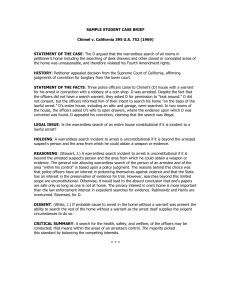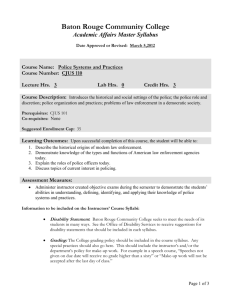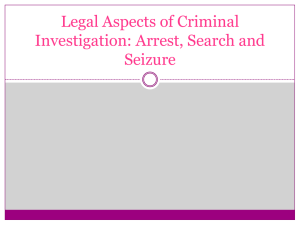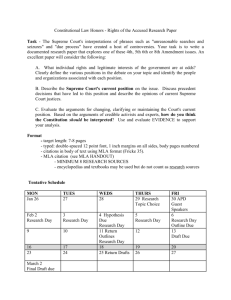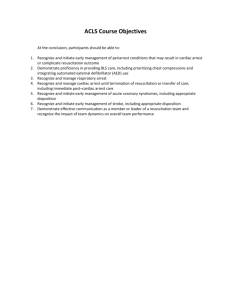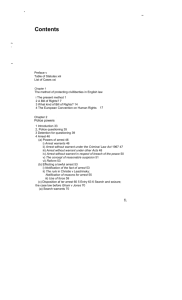1101 Arrests - Utah Valley University
advertisement
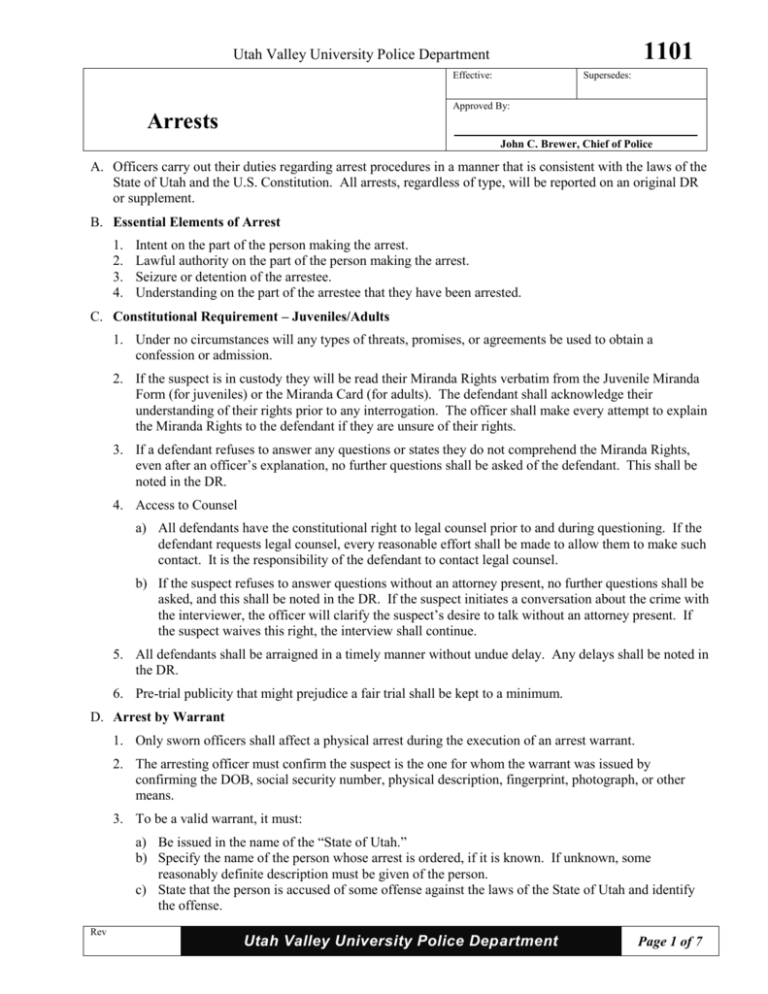
1101 Utah Valley University Police Department Effective: Supersedes: Approved By: Arrests John C. Brewer, Chief of Police A. Officers carry out their duties regarding arrest procedures in a manner that is consistent with the laws of the State of Utah and the U.S. Constitution. All arrests, regardless of type, will be reported on an original DR or supplement. B. Essential Elements of Arrest 1. 2. 3. 4. Intent on the part of the person making the arrest. Lawful authority on the part of the person making the arrest. Seizure or detention of the arrestee. Understanding on the part of the arrestee that they have been arrested. C. Constitutional Requirement – Juveniles/Adults 1. Under no circumstances will any types of threats, promises, or agreements be used to obtain a confession or admission. 2. If the suspect is in custody they will be read their Miranda Rights verbatim from the Juvenile Miranda Form (for juveniles) or the Miranda Card (for adults). The defendant shall acknowledge their understanding of their rights prior to any interrogation. The officer shall make every attempt to explain the Miranda Rights to the defendant if they are unsure of their rights. 3. If a defendant refuses to answer any questions or states they do not comprehend the Miranda Rights, even after an officer’s explanation, no further questions shall be asked of the defendant. This shall be noted in the DR. 4. Access to Counsel a) All defendants have the constitutional right to legal counsel prior to and during questioning. If the defendant requests legal counsel, every reasonable effort shall be made to allow them to make such contact. It is the responsibility of the defendant to contact legal counsel. b) If the suspect refuses to answer questions without an attorney present, no further questions shall be asked, and this shall be noted in the DR. If the suspect initiates a conversation about the crime with the interviewer, the officer will clarify the suspect’s desire to talk without an attorney present. If the suspect waives this right, the interview shall continue. 5. All defendants shall be arraigned in a timely manner without undue delay. Any delays shall be noted in the DR. 6. Pre-trial publicity that might prejudice a fair trial shall be kept to a minimum. D. Arrest by Warrant 1. Only sworn officers shall affect a physical arrest during the execution of an arrest warrant. 2. The arresting officer must confirm the suspect is the one for whom the warrant was issued by confirming the DOB, social security number, physical description, fingerprint, photograph, or other means. 3. To be a valid warrant, it must: a) Be issued in the name of the “State of Utah.” b) Specify the name of the person whose arrest is ordered, if it is known. If unknown, some reasonably definite description must be given of the person. c) State that the person is accused of some offense against the laws of the State of Utah and identify the offense. Rev Utah Valley University Police Department Page 1 of 7 1101 d) Be signed by a magistrate or judge, and the judge’s office must be named in the body of the warrant, or in connection with their signature. e) Warrants must be confirmed via Communications prior to arrest. f) If it is necessary to establish identity before a person is booked into jail on a warrant, a fingerprint check may be made by an authorized person from our agency or another agency. g) In cases where identification is inconclusive, the person will be released after photographs, fingerprints, and personal information (e.g., home and work address) are obtained. These items will be gathered at the scene, the subject will not be transported to the station. E. Arrest Without a Warrant 1. An officer may, without a warrant, arrest a person if the officer has probable cause to believe that: a) A felony has been committed and the person to be arrested has committed the felony. b) A misdemeanor has been committed in the officer’s presence and the person to be arrested has committed the offense. c) The person to be arrested has been involved in a traffic accident and violated any criminal section of the Utah criminal statutes, Traffic code, and that such violation occurred prior to or immediately following the traffic accident. d) A misdemeanor has been committed and the person to be arrested has committed the offense. If a person is arrested under these circumstances, they are eligible for release under (put Utah code here.) e) Physical arrests will not be made for infractions. 2. An officer may stop and detain a person to investigate an actual or suspected violation of any traffic law committed in their presence and serve a copy of the traffic complaint for any alleged civil or criminal traffic violation. An officer who serves a copy of the traffic complaint shall do so within a reasonable time after the alleged criminal or civil traffic violation. F. Other Arrests 1. Citizen’s Arrest a) Before accepting a prisoner arrested by a private citizen, the officer will ensure that the following elements of arrest are present: (1) The prisoner is in custody of the citizen (either by actual physical restraint or the prisoner’s voluntary submission to the arrest) who intends to prosecute. (2) The citizen making the arrest has informed the person to be arrested of the intention to arrest and the cause of the arrest. (3) The citizen arrest is apparently lawful. The criminal act was committed in the citizen’s presence, and all elements of the crime are present. b) When the suspect is to be incarcerated, the investigating officers will print their names and serial numbers on the Arrest/Booking Record. The name and address of the arresting citizen will be listed in the DR. (1) Arresting citizens will be advised that they may be required to sign complaints; however, they will receive a subpoena to testify in court if the suspect contests the charge. (2) If the offense involved is a felony, officer will advise the victims that they will be contacted at a later time if it is necessary to sign the complaint. 2. Summons and Complaint In Lieu of Arrest: If a citizen does not desire to make an arrest or is unable to make an arrest but desires prosecution, a DR will be completed. Officers will inform the citizen that the report will be forwarded to the appropriate prosecutor for review. 3. Fugitive Arrest: A fugitive is any person wanted by any law enforcement agency outside the State of Utah on a verified felony warrant. Rev. Date Utah Valley University Police Department Page 2 of 7 1101 4. Warrants for Arrest from a Law Enforcement Agency: A warrant for the arrest of a wanted subject will be honored if received from law enforcement or correction agency or other public authority with powers of prosecution and extradition. a) Confirmation of the warrant shall include verification that extradition has been authorized prior to conducting a physical arrest. b) Warrants should contain the following information, regardless of how they are received: (1) (2) (3) (4) (5) (6) (7) (8) (9) Warrant number, date of warrant, judge, issuing agency. Charges. Suspect’s full name and date of birth. Physical description. Date, time, and name of officer authorizing the hold. Bond amount, if any and court address. Recommended bond, if any. Statement that the demanding agency will extradite. County and state where the warrant was issued. c) Demands by teletype or e-mail with the above information should state that certified copies of the complaint and warrant will follow via facsimile or U.S. mail. d) Letters requesting arrests from other agencies will be honored if accompanied by certified copies of the complaint and warrant and a statement that extradition has been authorized. Warrants by telephone usually will not be honored except in unusual or emergency cases. The issuing agency will be asked to fax the required warrant and extradition information immediately following the telephone call. A supervisor must authorize the arrest before it can be made. e) The arresting officer will determine that the person about to be arrested is the person named on the demanding agency’s warrant and will advise the defendant of the charge, the agency that has requested the arrest, the fact that a warrant has been issued and the amount of any bail. f) The suspect will be booked as a “Fugitive of Justice.” Desertion warrants will be handled in the same manner as a Fugitive from Justice. 5. NCIC Arrests: When a fugitive suspect is detained based on information received through UCJIS/NCIC, the following procedure will be used: a) The arresting officer will request Communications to confirm the warrant and if extradition is authorized. (1) If the warrant is no longer valid, the suspect will be released if there are no other charges. (2) If the warrant is valid, but extradition is denied, the suspect will be released if there are no other charges. (3) If the warrant is valid, but the issuing agency is unable to immediately confirm extradition (county attorney not available, Records Section closed, etc.) the suspect will not be booked. Photographs and fingerprints will be obtained at the scene and the person’s address and place of employment confirmed. The subject will not be transported to the police station under these circumstances. Communications will be contacted and informed of the disposition of the wanted person (booked or released) so entry can be made into the UCJIS/NCIC System. 6. Fugitive Departmental Report: A Fugitive of Justice (FOJ) DR will be made regardless of whether or not a problem with the identification of a wanted suspect exists. It shall document if an interview was conducted by the arresting officer, or incriminating statements were made by the suspect that may assist the originating agency. 7. Foreign Fugitives: Information on suspects wanted by foreign countries is available in NCIC. Special inquiries into this file are not required, as all wanted person file inquiries will be searched against the Foreign Fugitive File. If a positive response is received, the following procedure will be used: Rev. Date Utah Valley University Police Department Page 3 of 7 1101 a) A supervisor notified shall be notified. b) INTERPOL will be contacted and advised of the situation. INTERPOL will confirm or deny the warrant and attempt to estimate how long it will take to verify extradition. (1) If INTERPOL confirms the warrant and there are no other charges, the subject will be booked with a “hold” for INTERPOL. (2) If INTERPOL cannot confirm the warrant, the subject will be released unless there are other charges, and a DR will be written. 8. Non-Support: Warrants charging non-support from other states will be handled in the same manner as other out-of-state warrants. 9. Felony Warrant FOJ: Any person arrested for a felony warrant issued by an Utah law enforcement agency will be handled as a Felony Warrant FOJ. a) Communications shall be advised by the arresting officer of the disposition of the wanted person (booked or released) so entry can be made into the UCJIS/NCIC system. b) A Felony Warrant FOJ DR will be completed by the arresting officer. 10. Arrests in Other Jurisdictions: Officers must have supervisory approval before leaving the campus to make a probable cause or warrant arrest. Officers must notify the jurisdiction in which the arrest is to be made and request a local uniformed officer be present for arrests involving potentially violent subjects, unless exigent circumstances exist. 11. Military Personnel: When military personnel are arrested and booked, the arresting officer will notify the appropriate military personnel. a) Military personnel cannot legally be held for being absent without leave (AWOL) or desertion until verification of their status has been confirmed by military authorities. b) Military “holds” will not be placed on military personnel except when: (1) A Mandate or Process is issued by a military court directed to the department instructing that a particular person be held for military authorities. (2) When the military member is reported as being a deserter or AWOL. Personnel who are absent without leave from their unit are in violation of Title 50, Chapter 22, Article 86 of the Uniform Code of Military Justice. (3) When arrestees advise that they are AWOL. c) The following will be followed when military members are arrested for desertion or AWOL: (1) Contact Hill Air Force Base military police. (2) The subject’s name, rank, social security number, date of birth, and unit designation or station will be provided when requesting status. If the branch of the service is unknown and the subject claims to have been discharged, the place from which the subject alleges to have been discharged will be obtained. (3) The name, rank, and unit of the military person requesting the hold will be placed in the narrative of the Arrest/Booking Record. The charge description will be listed as “desertion” in violation of Article 86, Uniform Code of Military Justice. The military unit requesting detention will be required to provide a written detainer as soon as practical. d) The following procedure will be followed when a subject is arrested and is subsequently discovered to be AWOL or a deserter from a military service. (1) An inquiry will be directed to the appropriate military unit and verification made that the subject in question is still wanted. Information will be provided to the military unit regarding the name, rank, serial number, and unit designation or station of the subject. Rev. Date Utah Valley University Police Department Page 4 of 7 1101 (2) If the subject is still wanted, the name, rank, and unit of the person confirming that the subject is still wanted will be placed in the narrative of the Arrest/Booking Record and the subject will be held until picked up by the military unit. 12. Military personnel, arrested on non-military charges, found subsequently to be deserters or absent without leave, will be held as though they were apprehended for the original desertion or AWOL charges. 13. Arrest of Federal and State Employees: With the exception of those persons immune from arrest, the following special notifications will be made when certain federal or state employees are arrested and booked: a) Employers will be notified when any federal, county, state, or law enforcement agency personnel are arrested. b) Federal employees operating government vehicles are subject to all traffic laws with the exception of driver’s license violations. c) Postal Employees: When an on-duty postal employee is arrested for a criminal offense, the Postal Inspection Service will be notified. d) Department of Corrections (DOC) Employee: When a DOC employee is arrested or cited for any crime or major criminal traffic offense, the officer will notify the DOC on-duty supervisor. G. Splitting Charges: Officers arresting for both felony and misdemeanor offenses shall submit all charges to the county attorney, with the following option: 1. Civil traffic violations shall be submitted along with the criminal charges and not split between prosecuting agencies. Civil citations shall not be written separately from the criminal charges. If criminal citations are written, civil citations may also be written. If the criminal charges are to be longformed, no civil citations shall be issued (the civil violations shall be noted in the DR). H. Immunity from Arrest 1. Diplomatic Agents a) Diplomatic agents enjoy the highest degree of privilege. Diplomatic agents, such as ambassadors and foreign ministers, and their families are totally immune from arrest for any offense. Questions as to whether an individual is entitled to this immunity may be directed to the FBI. (1) They enjoy complete personal inviolability, which means they shall not be arrested or detained. (2) Their property or residences shall not be entered or searched. (3) They have complete immunity from the criminal jurisdiction of the host state and cannot be prosecuted no matter how serious the crime. (4) They have complete immunity from the obligation to provide evidence as witnesses and cannot be required to testify even when they have been the victim of a crime. (5) Family members forming part of the household of diplomatic agents (i.e., spouses, and children under the age of 21 [until 23 if they are full-time students at an institution of higher learning], and other such persons expressly agreed to by the State Department in extraordinary circumstances) enjoy precisely the same privileges as do the sponsoring diplomatic agents. b) Members of administrative and technical staff enjoy the identical privileges to those of diplomatic agents in respect to: (1) (2) (3) (4) Rev. Date Personal inviolability (arrest/detaining). Immunity from criminal prosecution. Immunity from obligation to provide evidence as witness. Recognized family members enjoy the same privileges from the host country’s criminal jurisdiction as their sponsors. Utah Valley University Police Department Page 5 of 7 1101 c) Members of service staff have much less in the way of privileges. (1) Service staff members have only official acts immunity (determined by U.S. courts with subject matter jurisdiction over the alleged crime, in full light of all the relevant facts, that the action complained of was an official act). (2) They enjoy no person inviolability. (3) They have no immunity from the obligation to provide evidence as witnesses. (4) Families of service staff members enjoy no privileges or immunities. 2. Formal Identity Documents a) The only authoritative identity document is the identity card issued by the State Department, Protocol Office. (1) The identification card will be 3 ¾” x 2 ½” and shall contain a photograph of the bearer. (2) The bearer’s name, title, mission, city and state, date of birth, identification number, expiration date, and a U.S. State Department seal will appear on the front of the card. A brief statement of the bearer’s immunity shall be printed on the reverse side. b) While this form of identification is generally to be relied upon, officers are nonetheless urged to immediately seek verification with any serious incident or in any case where they have reason to doubt the validity of the card. 3. Police Contact with Diplomatic Persons a) When, in the course of responding to or investigating an apparent violation of criminal law, a police officer is confronted with a person claiming immunity, official State Department identification shall immediately be requested in order to verify the person’s status and immunity. b) The officer shall immediately notify supervisor, who shall be responsible for verifying the identification and directing the officer of the appropriate action to be taken. In an incident involving any person entitled to immunity, the officer shall record all pertinent details from the identity card and fully record the details and circumstances of the incident in accordance with normal police procedures. c) Stopping a diplomatic officer and issuing a traffic citation does not constitute an arrest and is permissible, although signature of the citation by such individual cannot be required. A written report of the incident shall be completed, documenting the facts of the incident and the identity of the individual and shall be promptly forwarded to the State Department. 4. Legislators: Legislators are immune from arrest and are not subject to any civil process, including civil traffic citations, while the legislature is in session, for 15 days prior to the start of the session, and while traveling from their residences to attend a session or returning home from a session. a) This immunity does not apply in cases of treason, felonies, or misdemeanors amounting to a breach of the peace. b) Officers will make arrests for misdemeanors only in cases of an offense by violence, an immediate disturbance of the public order (i.e., assault), or for driving a motor vehicle while under the influence of intoxicating liquor or drugs. c) The interpretation of a breach of the peace and decision to arrest will be referred to a supervisor in all cases. d) An appropriate investigation should be conducted to confirm the individual’s legislative status. e) Offenses committed by members, families, or employees of all other Foreign Consulates will be referred to a supervisor. 5. Foreign Nationals/Consular Notification Rev. Date Utah Valley University Police Department Page 6 of 7 1101 a) The United States is obligated under international treaties and customary international law to notify foreign authorities when foreign nationals are arrested, or otherwise detained, in the U.S. These obligations include: (1) To immediately inform the foreign national of the right to have their government notified concerning the arrest. (2) If the foreign national asks that such notification be made, it shall be done without delay by informing the nearest consulate or embassy. The officer shall fax the notification form to the Consular officer. (3) If the foreign national’s country is not on the mandatory notification countries list and the foreign national declines notification, the officer shall have them sign the notification form. No notification will be made. (4) Certain countries have mandatory notification without delay, regardless of whether the arrestee so wishes. A list of these countries may be found in the Consular Notification and Access Reference Card. (5) For both mandatory and non-mandatory consul notification countries, the officer shall document in the report whether notification occurred. The notification form shall be impounded as evidence. b) Whenever a foreign national is arrested, the arresting officer is responsible for ensuring the appropriate notifications to representatives of the foreign country are made. Instruction on proper notification can be obtained from the U.S. Department of State. Inquiries regarding contact with foreign governments should be made to the Assistant Legal Advisor for Consulate Affairs, Department of State, (202) 647-4415, Fax (202) 736-7559. Urgent after-hours inquiries may be directed to the Operations Center at (202) 657-1512. c) Foreign Nationals: If an officer is incarcerating an arrestee who is not United States citizen, the officer shall notify the country of citizenship if the arrestee does not waive notification or if that country requires notification regardless of a waiver. The officer shall document all details of the notification or any waiver of notification on the consular notification form that must be included with the officer’s report. 6. Witnesses: A witness under subpoena is immune from arrest except for treason, felony, or a breach of the peace while attending or traveling to or from court. Rev. Date Utah Valley University Police Department Page 7 of 7
